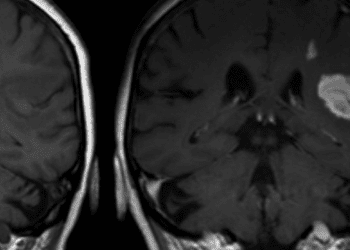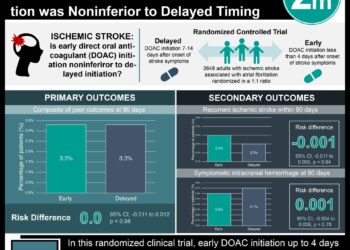Proton pump inhibitor co-therapy reduces gastrointestinal bleeding risk of oral anticoagulants
1. In this retrospective cohort study, rivaroxaban had the highest and apixaban had the lowest upper gastrointestinal bleeding (UGIB) risk.
2. Proton Pump Inhibitor (PPI) co-therapy reduced UGIB risk, regardless of anticoagulant used.
Evidence Rating Level: 2 (Good)
Study Rundown: Oral anticoagulants have a known risk of major upper gastrointestinal bleeding (UGIB), with certain non-vitamin K anticoagulants potentially having higher UGIB rates than warfarin. While proton pump inhibitors (PPIs) lower UGIB risk with warfarin, it is unclear if these benefits extend to other anticoagulants. In this retrospective cohort study of Medicare beneficiaries, the risk of UGIB was assessed with use of select anticoagulant (apixaban, dabigatran, rivaroxaban, and warfarin) with and without PPI co-therapy. In this cohort, rivaroxaban had the highest and apixaban had the lowest upper gastrointestinal bleeding (UGIB) risk. With PPI co-therapy, the risk of UGIB was reduced for each oral anticoagulant that was tested.
Overall, the study can be used to help inform patients when discussing the risks and benefits of commonly prescribed oral anticoagulants and suggests PPI co-therapy may be suitable for those with significant bleeding risk. The study’s results were limited by potential misclassification of anticoagulants, PPI co-therapy, or NSAID use in the Medicare database as well as possible confounders such as aspirin use or Helicobacter pylori infection.
Click to read the study in JAMA
Relevant Reading: : Gastrointestinal Safety of Direct Oral Anticoagulants: A Large Population-Based Study
In-Depth [retrospective cohort]: Data was obtained from computerized Medicare beneficiaries files between January 1, 2011 and September 30, 2015 and included patients 30 years or older that had initiated treatment with apixaban, dabigatran, rivaroxaban, or warfarin. Exclusion criteria included those with end-stage renal disease, serious gastrointestinal illness predisposing to bleeding (e.g., esophageal varices, gastrointestinal cancer), and bleeding-related hospitalization in the past year. Primary endpoints included hospitalization for UGIB that was potentially preventable by PPI co-therapy. Overall, there were 1,643,123 patients with 1,713,183 new episodes of oral anticoagulant treatment in this study (mean age 76.4 years, main indication being atrial fibrillation [74.9%]). The adjusted incidence of hospitalization for UGIB were the following: apixaban (73 per 10,000 person-years), dabigatran (120 per 10,000 person-years), rivaroxaban (144 per 10,000 person-years), and warfarin (113 per 10,000 person-years). When oral anticoagulant therapy with PPI co-therapy was compared to without PPI co-therapy, risk of UGIB was lower overall (IRR 0.66; CI95 0.62-0.69). Risk was lower for each oral anticoagulant that was tested (p < 0.05).
Image: PD
©2018 2 Minute Medicine, Inc. All rights reserved. No works may be reproduced without expressed written consent from 2 Minute Medicine, Inc. Inquire about licensing here. No article should be construed as medical advice and is not intended as such by the authors or by 2 Minute Medicine, Inc.







